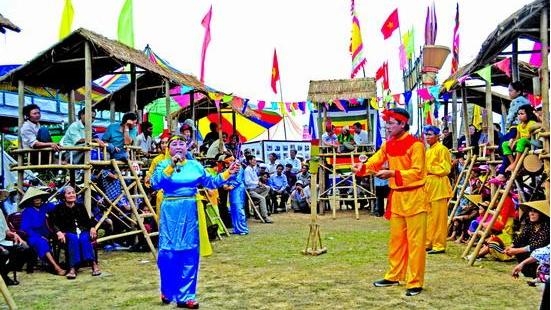


|
A performance of "Bai Choi" singing
The decision was announced on November 7 during the 12th
session of the UNESCO Intergovernmental Committee for the Safeguarding of the
Intangible Cultural Heritage, which is being held in Jeju, the Republic of
Korea.
‘Bai Choi’ singing was one of 34 nominations considered by the
committee for inscription on the Representative List of the Intangible
Cultural Heritage of Humanity during the working session.
The dossier of Bai Choi singing met all of
the necessary criteria and was highly appreciated by all of the 24 Committee
members.
The UNESCO Council acknowledged Bai Choi singing
as an important communal cultural activity, meeting the entertainment and
arts demands of the community. Stories featured in the art form convey ethic
lessons about patriotism, solidarity in the communities, and the experiences
of ancestors.
The submitted dossier of Bai Choi also
detailed the efforts made both in the past and at present to preserve the art
form of the community, groups, and art clubs under the support of Vietnamese
Government.
UNESCO’s recognition of Bai Choi reaffirmed
the diversity of culture in Vietnam’s ethnic groups.
Bai Choi singing is popular in Quang Binh, Quang Tri, Thua
Thien-Hue, Quang Nam, Binh Dinh, Phu Yen, Khanh Hoa and Da Nang.
Bai Choi is often seen at local spring festivals and resembles a game, using
playing cards and village huts. The Bai Choi songs are about festivals, daily
life and work and are accompanied by musical instruments.
Bai Choi singing became the tenth Vietnamese cultural practice
to be awarded UNESCO’s intangible heritage status, together with the Mother
Goddesses belief of three realms, Vi Dam singing, Don
Ca Tai Tumusic, the worship of Hung Kings, the Giong festival, love duet
singing in Bac Ninh province, Hue's royal court music, Gong space culture in
the Central Highlands, and folk tugging rituals and games.
Previously, the cultural practice was honoured by Vietnam’s
Ministry of Culture, Sports and Tourism as a National Intangible Cultural
Heritage in November 2014.
|
Source: NDO